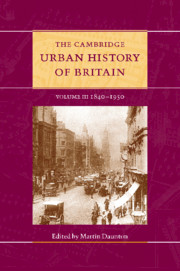Book contents
- Frontmatter
- 1 Introduction
- Part I Circulation
- Part II Governance
- Part III Construction
- Part IV Getting and spending
- 18 Industrialisation and the city economy
- 19 The urban labour market
- 20 Urban fertility and mortality patterns
- 21 The middle class
- 22 Towns and consumerism
- 23 Playing and praying
- Part V Images
- Select bibliography
- Index
- Plates 1-7
- Plates 8-14
- Plates 15-20
- Plates 21-27
- Plates 28-34
- Plates 35-41
- Plates 42-48>
- Plates 49-53
- References
21 - The middle class
from Part IV - Getting and spending
Published online by Cambridge University Press: 28 March 2008
- Frontmatter
- 1 Introduction
- Part I Circulation
- Part II Governance
- Part III Construction
- Part IV Getting and spending
- 18 Industrialisation and the city economy
- 19 The urban labour market
- 20 Urban fertility and mortality patterns
- 21 The middle class
- 22 Towns and consumerism
- 23 Playing and praying
- Part V Images
- Select bibliography
- Index
- Plates 1-7
- Plates 8-14
- Plates 15-20
- Plates 21-27
- Plates 28-34
- Plates 35-41
- Plates 42-48>
- Plates 49-53
- References
Summary
THE ISSUES
In recent years historians have begun to put flesh on the bones of the modern British middle class. Given the rapidly increasing proportion of the population living in urban (including suburban) rather than rural areas, much of this work has dealt with towns, cities and urban regions. These studies have identified the substantial economic, social and political resources that the middle class marshalled in urban Britain. Indeed, writing with reference to the period 1780–1870, R. J. Morris has argued that British towns were ‘substantially the creation of their middle class, and in turn provided the theatre within which that middle class sought, extended, expressed and defended its power’. Thus no survey of urban Britain would be complete without an analysis of the middle class. Equally, no analysis of the middle class can avoid sustained attention to the ‘urban variable’. As Mike Savage has suggested, analysis of place is central to the investigation of class formation, a concept which in turn provides a useful way of avoiding both the solely structural, and the solely cultural, approaches to the vexed but crucial subject of class.
Yet this chapter cannot be a straightforward survey. For a start, rather than assume the impact of the middle class on urban Britain, it is necessary to demonstrate how far and how this influence was sustained – in relation both to the surprisingly influential aristocracy and to the increasingly well-organised working class. This demands particular care because historical research on the middle class has concentrated on the period prior to 1900, after which significant changes occurred – notably accelerating suburbanisation – in the structure and nature of urbanisation.
Keywords
- Type
- Chapter
- Information
- The Cambridge Urban History of Britain , pp. 673 - 714Publisher: Cambridge University PressPrint publication year: 2001
References
- 4
- Cited by



